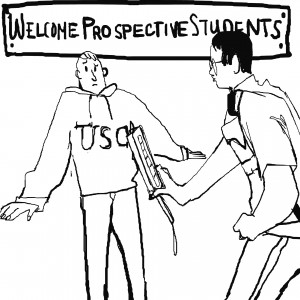Background checks valid in screenings
The phrase “background check” generally holds a negative connotation. You think of a private investigator trying to uncover a scandal. You think of politicians.
You’re not as quick to think of college applications.
Most universities — about 64 percent, according to the American Association of Collegiate Registrars and Admissions Officers — tell applicants to disclose their criminal records. Some students choose to withhold that information and leave it to the colleges to dig up the dirt, something most colleges do not have the time or resources to do. Still, it is a necessary step for admissions officers to take when reviewing an application, just as it is when reviewing a transcript.
At first glance, this might seem to be an invasion of privacy. It would appear that colleges do not give people with a checkered past a chance. Background checks, however, are essential to preserving safety, both on campus and within the student body. By making the necessary effort to determine whether the students on campus have clean records, colleges are taking a progressive step toward ensuring that everyone — from students to employees — are safe.
If colleges can reject students for low grade point averages, low test scores or a weak essay, why shouldn’t they be allowed to reject students with criminal records?
Currently, most universities don’t perform background checks on applicants — only about 4 percent of universities go through with a background check, according to a survey by the AACRAO. Compare that to the 92 percent of businesses that do carry out background checks on job applicants. The safety of a college campus should be tantamount to that of an office workplace.
Many universities require exorbitant funds for tuition and other fees; they should be able to dedicate a portion of those resources to hiring people responsible for conducting basic criminal checks on applicants.
Scores of institutions, including the University of North Carolina and the University of Virginia, have amped up their screening processes following violent incidents on campus. Although minor acts of violence are inevitable, admissions offices need to take every step possible to protect the student body from tragedy. They should refocus their time — instead of searching a student’s name on Google and perusing their Facebook photos to make sure they aren’t participating in underage drinking, they should be investigating a history of violence.
That is not to say students with criminal records should be excluded from the collegiate system entirely. Public schools are funded by the government, and as such are designed to serve the general public. Applicants who have shown clear evidence of a turnaround and change in behavior should not be deprived of a college education if no private school will admit them. If the transgressions on an applicant’s record are not serious enough that the school feels he would endanger the campus, then private and especially public schools should consider accepting him.
Essentially, these applicants should comply with any requests by the admissions committee to learn more about them. With measures such as additional interviews, the admissions committees could gain a thorough understanding of the situation, as opposed to simply reading their criminal reports and subsequently eliminating them from the applicant pool.
Accepted applicants should be required to have a face-to-face interview with an admissions officer in order to be fully certain the applicant does not present a threat.
Those who have shown they have changed should be able to move forward with their lives and have the college experience they earned, regardless of what might have appeared on their background checks.
Cyrus Behzadi is a freshman majoring in communication.


What about if the student is under 18 during the application process, as most are, would they not be classified as a child still?
Many violent incidents are carried out by those with mental health problems. What about screening for that? Also, what about those who have had treatment for drug or alcohol addiction? They could turn violent if they have a relapse. And don’t forget those who had a fight or other violent incident in high school.